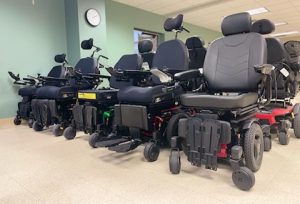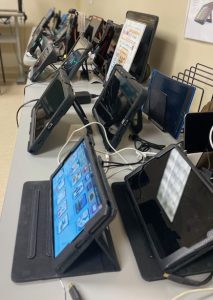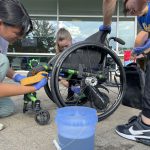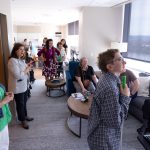At the Center for Assistive Technology, a personalized wheelchair or hearing aid is more than just equipment — it is also a chance to change someone’s life and support them as they achieve their goals and follow their dreams.
Since 1992, UPMC’s Center for Assistive Technology (CAT) has been providing customized mobility, communications, and comfort products and services to people with disabilities. And, by doing so, they have significantly improved the quality of life for their patients.
The CAT houses a multi-disciplinary group of passionate professionals, such as clinicians, physicians and advanced practice providers, physical therapists, occupational therapists, speech language pathologists, audiologists, and rehab engineering technologists, each ready to share their expertise and provide support to the people that come in. The team includes Vince Schiappa, MS, ATP, clinic manager, Becky Russell, PT, DPT, ATP, physical therapist, team lead, Seating and Wheeled Mobility, Mary Jane Edwards, administrative coordinator, and Dana Boyer, administrative coordinator.
Each patient’s needs are unique and personal. The team’s combined expertise gives them the ability to provide highly personalized mobility and communications equipment.

“We do a full therapy evaluation with them and then we are able to work with local suppliers and companies to make [product] recommendations … and really work with [patients] to figure out what custom equipment will work best for them to allow them to be independent and comfortable and protect their skin,” Becky said. “The goal is to help people to live their lives as independently as possible, to be able to access their homes and communities, and participate in meaningful activities.”
The center also offers services for augmentative and alternative communication, including speech generating devices, as well as computer access and other assistive technologies.

“The program’s speech and language pathologist assesses and provides recommendations to fulfill communication needs, while rehabilitation engineers work closely with our patients to identify the most appropriate types of assistive technology and applications, such as computer and smartphone access, mounting of devices, smart home technology, home and work modifications, and adaptive gaming,” Dana said. “Similarly, the audiologist identifies listening assistive technologies to assist them in their home or work, including Bluetooth connected microphones, specialized professional equipment, alerting systems like a bed shaker, and hearing accessible telephones.”
Meaningful Moments
At the CAT, providing a customized device is just the beginning of the process. Many of their patients will return to receive adjustments on the technology they use, and the team at CAT will also provide family with trainings on more basic personalization that they can do for their loved one.
“It’s very rewarding to be able to provide hands-on help. [If an armrest isn’t working], I take my wrench out and tighten up a few bolts,” Vince said.
Each team member has memorable moments that have inspired them in their work, whether it is adjusting a power wheelchair to allow an individual with multiple sclerosis to drive independently, building connections and trust with complex patients, or watching a young adult flourish as they adapt to living with a disability.
“I think some of my favorite moments are when a patient calls in to be scheduled and it’s a new diagnosis. I get to encourage them and let them know that they’re in good hands,” said Mary Jane. “I can take some of the worry of the process away and hear them go from anxious or nervous to confident and comfortable. I’m passionate about moving [the administrative details] along because, at the end of the day, it means people getting what they need to accomplish goals and live their life to the fullest.”
For Dana, working with patients within the audiology department is deeply meaningful.
“As a hearing aid user myself, I’m able to connect with some of our hearing-impaired patients and people that are getting their hearing aids for the first time … and share experiences,” she said. “So, it’s very enjoyable.”
Changing Patients’ Lives
Each day, the team at CAT strives to provide a better quality of life for their patients. Even if they are contacted by an individual that they cannot assist through their services, they will send other resources that could help, in order to keep the process moving along.
They aim to support people, no matter what step of the process they are in. Some of their clients are still adapting to a diagnosis, injury, or progressive condition, and they are there to work with them throughout that journey.
“I am not going to let anyone feel their emotions alone. It’s important to any human to feel like you’re not walking through these situations alone,” said Mary Jane. “How do I help them move from overwhelmed to empowered?”
At CAT, it’s not just about the technology patients are provided with. It is also about empowering them through the process and helping them to experience newfound confidence and joy.
“We get to plant that seed of hope,” Becky said.
Technology and Devices Provided by CAT
The CAT assists with complex rehab technology (CRT), which includes customized devices such as:
- – Manual and power wheelchairs
- – Complex speech-generating devices
- – Adapted hearing aids
- – Other technologies to assist with access to a personal computer, tablet, or phone
However, they do not cover generalized durable medical equipment (DME), such as walkers, canes, crutches, and basic communication boards and mats.
The CAT also collaborates with other UPMC departments and initiatives, such as Assist+ and the Disabilities Resource Center, as well as the University of Pittsburgh Adaptive Driving Program and Department of Rehabilitation Science and Technology, to partner on research, education, and raising awareness of assistive technology. To learn more, visit the center’s web page, call 412-647-1310, or email catfrontdesk@UPMC.edu.
Image credits: Center for Assistive Technology









